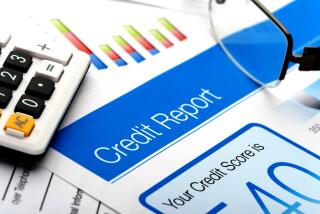‘Everybody’ Doesn’t Know the Score on Credit Ratings
- Share via
Question: In preparation for getting a mortgage, I recently closed three credit card accounts that I’d opened more than 10 years ago but hadn’t used much lately. Everybody I talked to told me these unused accounts should be closed as a way of improving my credit score, because otherwise it would look like I had too much available credit. But recently you wrote that closing accounts is a bad idea. Who’s right?
Answer: Certainly not “everybody.”
Here’s the word straight from Fair, Isaac & Co., the company that created the three-digit credit score that’s used by most lenders: Closing accounts can never help your score, and may hurt it.
Once more, with feeling: Closing accounts can never help your score.
Many lenders do indeed look askance at people who have too many open lines of credit. (What’s too many? Fair Isaac’s not saying, unfortunately, although it seems to depend on how long you’ve had credit and how you use the credit you’ve got.) They fear the consumer could suddenly max out their cards and then default.
But once you’ve gone ahead and opened the line of credit, you can’t help your score by shutting it off. That’s because the credit score looks at the difference between the balances on your accounts and your available credit (your total credit limit). Suddenly reducing your total available credit makes the balances you carry look a lot bigger in proportion, and that’s not good.
This is true even if you pay off your credit cards and other accounts in full each month. The score doesn’t distinguish between a balance that’s paid off and one that’s carried from month to month.
You also goofed by closing older credit lines. Part of your credit score depends on how long you’ve had credit. Those 10-year-old accounts enhanced your credit history by showing you’ve responsibly used credit for a significant period of time.
Hopefully, you have at least four or five credit accounts still open. That’s the minimum that mortgage brokers say they like to see when arranging home loans.
In the future, remember to apply for new credit sparingly and only when absolutely necessary. That, and paying your bills on time every time, is the best way to improve your credit score.
*
Credit Bureau Can
Look Into Dispute
Q: I have a dispute over a car lease that’s driving me crazy. I turned in a leased car early to get a better deal on a new car. The dealer that leased me the new car made the final two payments on the older car. The original dealer called me, however, and insisted that I owed $600 for missing hub cabs.
After a long negotiation, I agreed to pay, but a lower amount than what the dealer wanted. Now my credit history shows a negative mark, because the car company is reporting a settlement--meaning I paid less than I owed. I wrote the car company and got no response. I finally spoke with someone at one of the credit bureaus, who told me not to worry about it because the settlement was so old that it would be dropped from my report in two months. Is there anything I can do?
A: Yes, but by the time you do it, the issue probably will be moot.
You have the right to challenge any information you think is incorrect on your credit report. As you already have tried to resolve this with the company, your next step is to formally ask your credit bureau to investigate the item. (The credit bureau has a form that walks you through this process; just call and ask.)
The credit bureau is required to query the original creditor. If the creditor doesn’t confirm the item, it must be dropped from your credit report.
The car company may stick to its guns. After all, you did pay less than originally requested. It’s too late to help you now, but part of your negotiations with the company should have included a demand that your credit report would not be adversely affected by this settlement.
You could keep fighting this, but there’s really not much point--especially if the negative item will fall off shortly.
As for your second question, the only possible answer is: It depends. The good news is that your credit score is more concerned with your recent behavior than what you’ve done in the past.
Although charge-offs, delinquencies, late payments and collections will hurt your score, a recent history of on-time payments and responsible credit use can start to improve your score almost immediately.
You’ll still feel some of the effects from those bad marks until they drop off your report--usually within seven years, although a bankruptcy can stay on as long as 10 years.
Liz Pulliam Weston is a contributor to The Times and a graduate of the personal financial planning certificate program at UC Irvine. Questions can be sent to her at askliz weston@hotmail.com or mailed to her in care of Money Talk, Business Section, Los Angeles Times, 202 W. 1st St., Los Angeles, CA 90012. She regrets that she cannot respond personally to queries. For past Money Talk questions and answers, visit The Times’ Web site at www.latimes.com/moneytalk.
More to Read
Inside the business of entertainment
The Wide Shot brings you news, analysis and insights on everything from streaming wars to production — and what it all means for the future.
You may occasionally receive promotional content from the Los Angeles Times.










